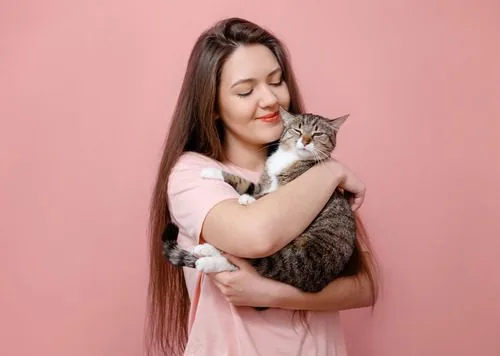Down Syndrome in Cats: What You Need to Know
The thought of your cat having a condition that affects their behavior or appearance can be concerning, especially when certain traits seem unusual. You might wonder if your cat could have something akin to Down syndrome. While it’s natural to seek answers, human and feline genetics differ but there are genetic and neurological conditions in cats that may present similarly to Down syndrome in humans. Let’s explore the fascinating world of cat health, where we’ll dive into what might really be going on when your cat displays those unexpected quirks.

Can Cats Have Down Syndrome?
Down syndrome is a genetic condition that occurs in humans when there is an extra copy of chromosome 21. This condition leads to a variety of physical and cognitive differences. However, cats have a different set of chromosomes. Instead of 23 pairs, cats have 19 pairs, and none of these correlate directly with human chromosome 21. Because of this fundamental genetic difference, cats cannot have Down syndrome as it is defined in humans.
Traits Similar to Down Syndrome
That being said, some cats do exhibit traits that might resemble those seen in humans with Down syndrome, such as unusual facial features, developmental delays, or differences in behavior. These traits can result from various other genetic conditions, congenital issues, or environmental factors rather than Down syndrome itself.
What Causes Down Syndrome-Like Symptoms in Cats?
When a cat displays Down syndrome-like symptoms, the underlying causes can vary widely. These can include:
- Genetic Abnormalities: Cats can have their own unique genetic mutations that lead to physical and behavioral differences. These mutations are not related to Down syndrome but can cause traits that might be mistaken for it.
- Congenital Defects: Birth defects that occur while the cat is developing in the womb can result in physical and neurological differences. These can include misshapen skulls, cognitive impairments, and other developmental issues.
- Infections During Pregnancy: If a mother cat contracts an infection during pregnancy, it can affect the development of her kittens, leading to a range of abnormalities that might resemble Down syndrome.
- Exposure to Toxins: Environmental toxins can also play a role in abnormal development in kittens, resulting in physical deformities or neurological issues.
While these conditions can cause symptoms that may seem similar to Down syndrome, they are distinct and require different approaches to care and management.
Signs Your Cat May Have Genetic and Congenital Conditions
Identifying genetic or congenital conditions in cats involves observing their physical and behavioral traits. Cats with these conditions may exhibit:
- Facial Abnormalities: Some cats might have unusual facial features, such as a flattened nose, wide-set eyes, or a smaller jaw. These traits can be mistaken for Down syndrome, though they typically result from other genetic issues.
- Developmental Delays: Cats that seem slower to develop motor skills or exhibit delayed cognitive abilities may have underlying congenital or genetic conditions. These cats may be slower to learn how to use the litter box, play with toys, or interact with humans.
- Behavioral Differences: Cats with neurological issues might exhibit unusual behaviors, such as repetitive movements, difficulty in coordination, or a lack of responsiveness to stimuli. These behaviors are not indicative of Down syndrome but rather of other neurological or genetic issues.
When Should You Contact Festival Animal Clinic?
If you notice any of these symptoms in your cat, contact Festival Animal Clinic. Your veterinarian can conduct a thorough examination, including genetic testing if necessary, to determine the cause of these symptoms and recommend appropriate care.
How to Care for a Cat with Special Needs
Cats with genetic or congenital conditions may require extra care and attention to ensure they lead comfortable, happy lives such as:
- Regular Veterinary Visits: Keeping up with routine wellness exams can help manage any ongoing health issues and catch new problems early. Your vet can offer advice tailored to your cat’s specific needs.
- Customized Diet and Environment: Some cats with developmental delays or physical abnormalities may benefit from a specialized diet or an environment adapted to their needs. For example, providing easy access to food and litter boxes can help cats with mobility issues.
- Enrichment and Socialization: Engaging your cat in regular play and social interaction is helpful for development, especially if they have cognitive or behavioral differences. Enrichment activities can stimulate their minds and help them adapt to their environment.
Creating a Supportive Home Environment
Creating a supportive home environment for a special needs cat involves making adjustments that cater to their unique requirements. Consider the following tips:
- Ensure your home has areas where your cat can retreat and feel secure. These spaces should be quiet, away from high traffic areas, and equipped with comfortable bedding.
- Place food, water, and litter boxes in easily accessible locations. For cats with mobility issues, using ramps or steps can help them reach their favorite spots without straining.
- Be mindful of how you handle your cat, especially if they have physical deformities or are more sensitive to touch. Gentle, slow movements can help prevent stress and injury.
Cats with special needs, whether due to genetic, congenital, or environmental factors, require a compassionate approach to their care. With the right care and attention, cats with unique needs can live fulfilling lives. At Festival Animal Clinic, we can help you navigate the complexities of caring for a special needs cat. If you have concerns about your cat’s health or believe they may have a condition resembling Down syndrome, call us today at (303) 850-9393 to schedule an appointment.
